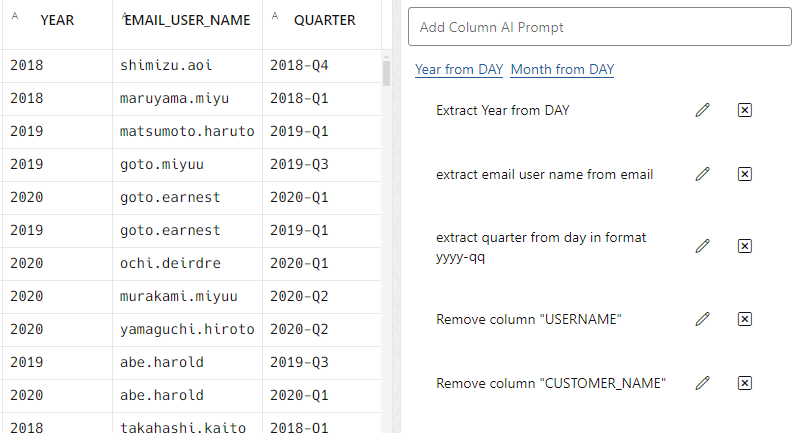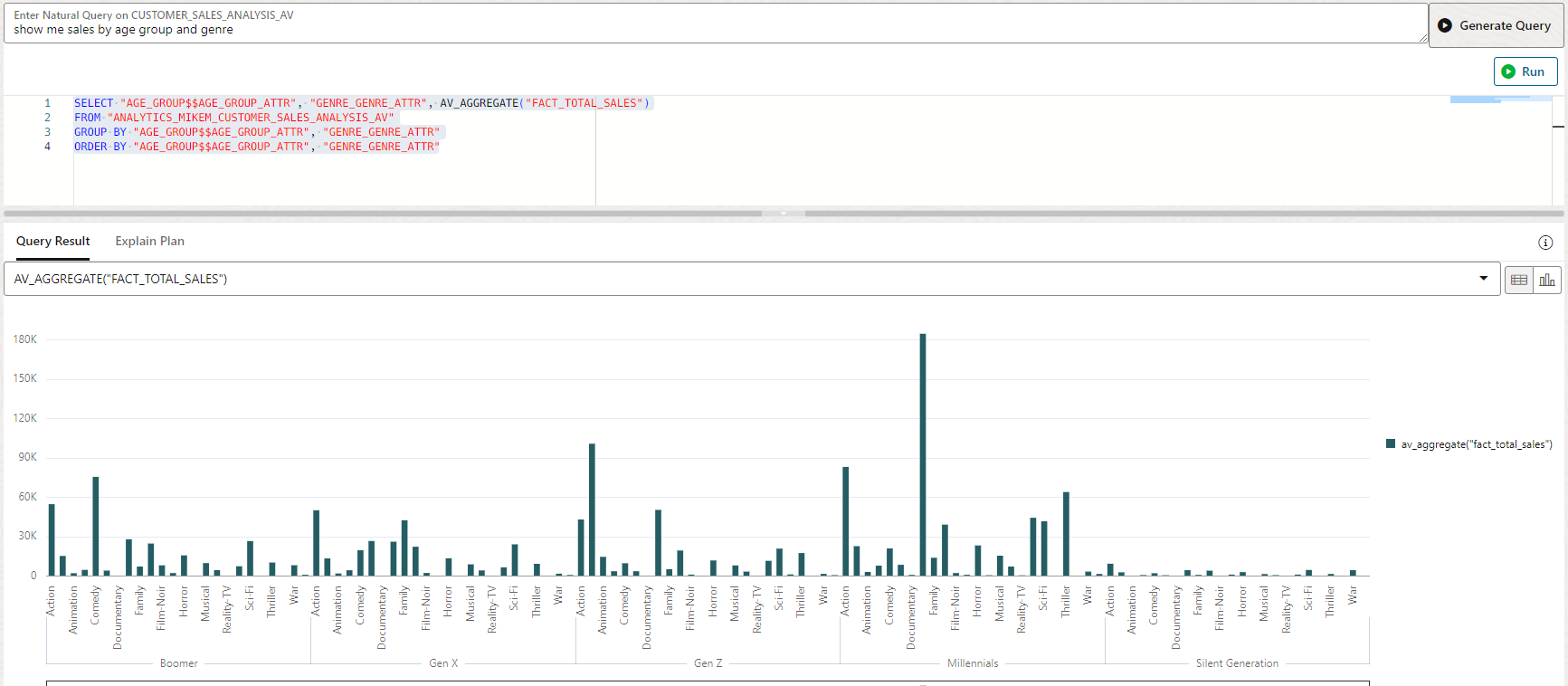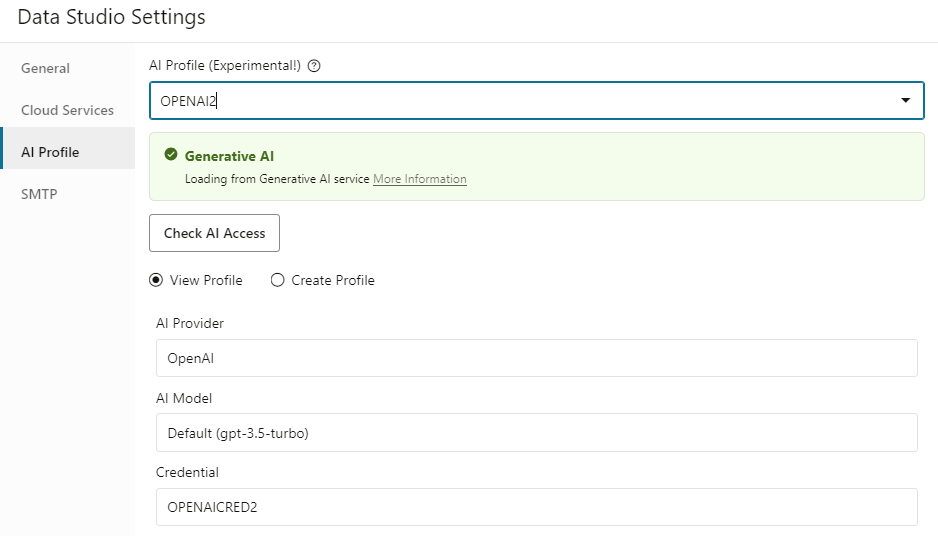Autonomous Database users love Data Studio, a fully integrated suite of self-service tools that assist them in loading, integrating, transforming and analyzing data from virtually any source.
Data Studio provides self-service tools with an intuitive user interface that can accelerate data-related tasks for experts and non-experts. But what if you can complete those tasks even faster and more easily with the power of AI? You can!
The upcoming release of Data Studio includes a wide range of new features to help improve the productivity of Data Engineers and Data Analysts, with the power of Generative AI at their fingertips.
Here are the highlights and benefits of the new Data Studio capabilities.
AI-Enhanced Data Load
Nobody wants to share sensitive or personally identifiable (PI) data accidentally. Similarly, you do not want to spend your valuable time working out how to perform difficult data preparation tasks, such as sifting through a large amount of text to understand customer sentiments, translating text, categorizing unstructured data, writing complex SQL expressions to extract aggregated date values, calculating the distances between points, aggregating data using window functions, or using regular expressions. These tasks can be so daunting and time-consuming if done manually.
Fortunately, Data Studio now includes AI-assisted data identification and enhancement features that can do all this – and much more – for you.
PI detection
In Data Studio’s Data Load tool, columns that may contain PI data are automatically detected. Whether it’s names, addresses or social security numbers, the system flags these details to help keep your data secure.

Sentiment analysis
Data Load can perform sentiment analysis using Oracle Cloud Infrastructure AI Language Services. You can now evaluate the sentiment of text data, such as customer reviews, during data load. A sentiment score (positive, negative, or neutral) is assigned to analyze the text’s tone. These scores are then seamlessly integrated into the dataset as an additional column, enabling businesses to quickly assess customer feedback and sentiment trends directly within their data tables.
Text translation
Data Load can now automatically translate text from the original language to a new target language during data loading. For example, you may have product reviews provided by users from around the world. Data Studio can translate each review and store them in a single language as a new column in your table.

Key Phrase Extraction
Key phrase extraction helps you highlight specific aspects of unstructured text, such as customer reviews of a product or service. For example, it could be used to categorize records based on phrases such as “high quality” or “modern design”. These key phrases are extracted from text columns as they are loaded.

New AI-Assisted Data Preparation
Not everyone is a SQL expert, but with Data Studio AI Assist, you don’t have to be. Data Studio AI Assist is designed to allow you to engineer and prepare your data by simply describing what you need in natural language. AI assistance translates this natural language intelligently into SQL, which you can review and modify if required, to perform virtually any type of data preparation action. The actions are organized as steps in reusable recipes that you can apply to your data to create new tables or views.
For example, if you want to extract the year from a date column, calculate the distance between two locations, or perform mathematical operations on columns, just type your request in everyday language, such as “extract year from order date,” “distance between warehouse and customer,” or “total sales by customer”. The AI assistant can generate the SQL code for you and allow you to see and verify the results.

Natural Language Queries in Data Analysis, and with Microsoft Excel and Google Sheets
Data Studio provides a Natural Language Query (NLQ) feature which helps users streamline data analysis through intuitive interaction. This feature offers two modes:
- SQL Generator Mode: You can generate SQL queries using natural language, allowing for initial query creation and subsequent customization to meet specific needs.
- Chat Mode: You can engage in a dynamic dialogue with your data. This mode enables you to ask questions, receive AI-driven responses, and refine your queries for deeper insights, making it an invaluable tool to explore and understand data more effectively.
In both modes, Data Studio works to interpret your plain language prompts into SQL that can work with your data, for example by adjusting user-provided input to match actual data values.
You can now use either Data Studio’s Analysis tool, or either of the two provided spreadsheet plug-ins, to converse with your data quickly and easily.

GenAI pipelines in Data Transforms
Data Transforms provides a full-featured built-in data integration tool for Data Engineers to design and run pipelines of data into Autonomous Database. The upcoming release of Data Transforms includes the ability to generate text and image vector embeddings in an Oracle 23ai Autonomous Database, facilitating improved data querying options such as image similarity and text semantics.

Choice of AI Profile and Large Language Model
For all these features, Data Studio will allow you to select the AI Profile and Large Language Model that works best for you. The options include OCI AI’s Cohere and Llama profiles, readily available for use with any Autonomous Database, or Open AI. You can even set up multiple profiles and easily switch between them to find the one that works best.

In Summary
Oracle Autonomous Database Data Studio includes AI-driven features that simplify data management, making it easier for users to handle complex tasks without advanced SQL skills. AI Expressions are designed to automatically identify Personally Identifiable (PI) data, analyze sentiment, translate text, and extract key phrases during data loading. Coming soon, AI Assist simplifies data preparation, even when sophisticated SQL expressions are needed. And Natural Language Query capabilities mean you can easily query data, even across multiple tables, without needing to know how to write SQL, and in your analysis tool of choice. Even better, you can try out different AI profiles and see which works best for you.
For more information, see the Data Studio documentation, and try out AI-assisted data management today!
